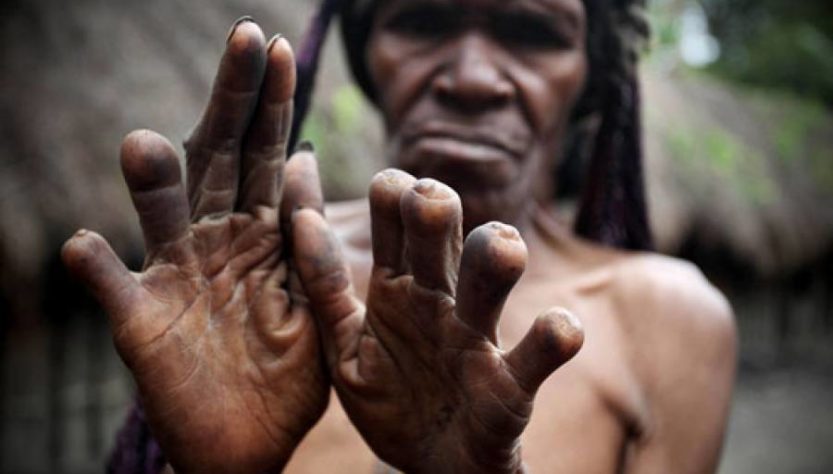These traditions and customs must make us proud as Indonesians because they can only be found in our homeland. Curious about what unique traditions make Indonesia different from the others?
- Kebo-keboan – Banyuwangi
The ritual, which is held once a year, is always held on the 10th of Suro or the 10th of Muharram in the village of Alasmalang, Singojuruh, Banyuwangi. This ceremony requires several men to dress up as buffalo and make sacrifices to plow the fields. After plowing the fields, these kebos are paraded around the village accompanied by a folk art carnival. This kebo – keboan ritual aims to ask for rain during the dry season.
- Funeral Traditions of the Minahasa Tribe – North Sulawesi
The Minahasa tribe has a unique funeral ritual that is different from other traditions. The Minahasa tribe positioned the corpse sitting while hugging its legs, not in a sleeping position. Funeral traditions like this according to belief symbolize a holy state and bring goodness. In addition to having to be in a sitting position, the direction of the corpse’s position must be facing north. This is because the stories are passed down from the ancestors of the Minahasa people.
- Pasola – East Nusa Tenggara
Pasola is a tradition that is carried out once a year by residents of Kampung Kodi, Kampung Lamboya, Kampung Wanokaka, and Kampung Garoa in the West Sumba region. This tradition of agility fighting using horses and javelins is the highlight of the Nyale Traditional Festival which is held to ask for the blessing of the gods and ancestors before the harvest season arrives. In Pasola, two “Knights of Sumba” will ride horses and attack each other using wooden sticks. The blood that falls on the Pasola arena is considered capable of making their land fertile so that the harvest is abundant.
- Burn Barges – Riau
Ethnic Chinese who live in Bagansiapiapi, Riau always hold a stick-burning ritual which is held every July. According to the belief, this ritual was carried out by their ancestors with the aim of being determined not to return to their place of origin. Another meaning is the commemoration of the sea gods Ki Ong Ya and Tai Su Ong who are depicted as two-sided gods.
- Ma’nene – Toraja, South Sulawesi
Residents in Toraja Regency have a unique ritual called Ma’Nene. The ritual that attracts tourists to visit Tana Toraja is carried out by removing the bodies of family members from the cemetery, then the bodies are cleaned and changed into clothes. Not infrequently these bodies are wrapped in a complete range of clothing, ranging from suits for men’s bodies, as well as dresses for women’s bodies. This unique ritual which is held every three years has a meaning of the importance of maintaining relationships with fellow family members, even with family members who have died first.
- Betis Fighting Tradition – South Sulawesi
In Indonesia, where most of the people are farmers, there are many traditions to be grateful for the harvest season. One of them is in Paroto Hamlet, Sanaeko Village, Barebbo, Bone, South Sulawesi, which carries out the tradition of calf fighting. Unique isn’t it? This tradition is carried out through the game of Malanca. The point is that young people have to put out their strength in order to follow this calf fighting tradition.
- Seba – Banten
The Baduy tribe is widely known as a tribe that closes itself off from the outside world and still maintains the local wisdom of their ancestors in this modern era. Even so, there are times when thousands of Baduy people leave the village and walk almost 100 kilometers to give their crops to Ibu Gede and Bapak Gede who are located in Serang city. What is meant by “Mrs. and Mr. Gede” are the Regent of Lebak and the Governor of Banten. This Seba tradition is carried out by the Baduy Tribe to maintain brotherhood and a form of gratitude to the local government like a tribute given to the kingdom.
- Finger Cutting Tradition – Papua
This fairly extreme tradition has indeed been abandoned by the Dani tribe. Finger cutting is a tradition to show sadness at the loss of a family member. For the Dani, the finger has a deeper meaning, symbolized as a form of harmony, unity, and strength in humans or a family. They cut off one of his knuckles as a form of loyalty to those closest to him who died. Cutting a finger is also interpreted as excruciating pain. In addition to affection, the cut fingers also show how many of their family members have died.
- Sharp Teeth Mentawai Tribe – Kalimantan
For the Mentawai tribe, a beautiful woman must meet three criteria. First, the long ears. Second, his body is decorated with titi or tattoos. Third, the sharp teeth. The tradition of sharpening teeth is believed to add to the beauty of the woman.
- Tabuik – West Sumatra
Tabuik is Arabic which means the word ark or parading. This tradition is carried out by people on the West Coast, West Sumatra which is held for generations. This tabuik ceremony is held every Ashura day which falls on the 10th of Muharram. This traditional ceremony is a symbol and form of expression of deep sorrow and respect for Muslims in Pariaman for the grandson of the Prophet Muhammad.
The need for digital IT is needed in daily activities, Bead IT Consultant is the right choice as your partner, visit our website by clicking this link: www.beadgroup.com

